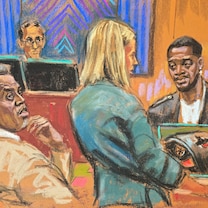Craig Will Have Hard Time Getting Out of Guilty Plea
Lawyers tell ABC News it's extremely difficult to withdraw a guilty plea.
Aug. 29, 2007 — -- Though Sen. Larry Craig, R-Idaho, pleaded guilty to disorderly conduct earlier this month, he said Tuesday that he had done nothing wrong and suggested that he may try to withdraw his plea.
But Craig will have a tough time getting out of that guilty plea, Minnesota criminal lawyers and law professors told ABC News. Unless he can show some serious flaw in the plea, Craig will probably be stuck with a criminal record.
"It's a final thing. If you put in a plea, that's that," said Jeff Mohr, a criminal defense lawyer in Minneapolis. "Unless there are really unusual circumstances, he wouldn't be able to withdraw."
Stephen Simon, a professor at University of Minnesota Law School, said Craig would have to prove a "manifest injustice" to get out of his guilty plea. That standard is so difficult to meet, he said, that motions to withdraw pleas are seldom made in Minnesota, and even less frequently granted.
Craig was arrested June 11 in the Minneapolis airport. Police say Craig entered a bathroom stall next to an undercover officer, then tapped his foot and rubbed it against the officer's -- a signal, police say, to engage in "lewd conduct."
Craig pleaded guilty to disorderly conduct, a misdemeanor. Another charge, interference with privacy, was dropped.
At a press conference Tuesday, Craig said he was not guilty of any crime.
"I did nothing wrong at the Minneapolis airport. I regret my decision to plead guilty," he said.
"While I was not involved in any inappropriate conduct at the Minneapolis airport or anywhere else, I chose to plead guilty to a lesser charge in the hope of making it go away," he said, adding that he had hired an attorney to advise him "on how to proceed."
Attorneys told ABC News that Craig could challenge his plea if he could prove that he didn't understand the charges against him or didn't understand that he had certain constitutional rights, such as the right to a lawyer and a jury trial. Craig was not represented by an attorney when he entered his plea.
But, in a written plea petition signed Aug. 1 by Craig and mailed to the Hennepin County court, Craig admitted that he engaged in "physical" conduct which he "knew or should have known tended to arouse alarm or resentment in others."





